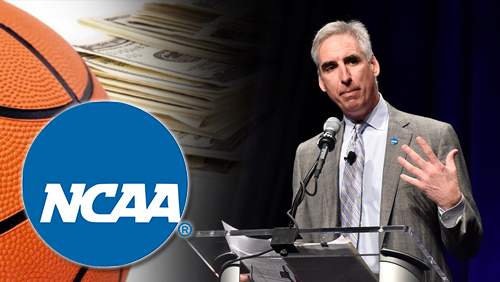 Don’t even think about it.
Don’t even think about it.
That was the message NCAA executives have for college athletes who might have taken an interest in playing fantasy sports.
NCAA Vice President for regulatory affairs Oliver Luck said Tuesday any student-athlete caught wagering on college sports—even DFS—will face a one-year ban, according to Mississippi State athletic director Scott Stricklin.
“Listening to NCAA’s Oliver Luck speak this morning in Dallas. He reminds that any athlete found to be gambling on college sports (includes daily fantasy such as DraftKings) automatically loses a year of eligibility,” Stricklin posted on Twitter.
The NCAA forbids sports gambling of any kind when it comes to collegiate athletics. Through its website, the association explained sports wagering “has the potential to undermine the integrity of sports contests and jeopardizes the welfare of student-athletes and the intercollegiate athletics community.”
Student athletes are required to sign affidavits prior to championship games, which, according to NCAA, tend to generate the most gambling.
It makes sense that the NCAA is keeping a vigilant eye on its athletes since DFS platforms also include college sports. But there’s no denying that athletes and even sports fans themselves cannot escape the deluge of advertisements pitching the virtues of sports betting and daily fantasy sports.
Disney-owned ESPN—expected to reap major gains from DFS ads—has been very vocal about its push to regularly discuss gambling in its shows starting this season. But the controversial “cover alert” that it rolled out during the recent Baylor-SMU telecast irked many colleges, prompting the broadcaster to shelf the idea after one week.
John Wildhack, ESPN executive VP of programming and production, told Sports Business Daily: “We did it once. I didn’t like it, and we stopped it. To me, it was too overt. Part of everything we do has a little bit of trial and error.”
ESPN’s cover alert has to do with real-money betting, but that hasn’t stop several athletic directors from insisting that the network’s new stance stemmed from its business dealings with DFS operators. NCAA Big 12 Conference Commissioner Bob Bowlsby said they have been “dealing with all the issues around DraftKings and FanDuel, which I don’t think anybody can suggest isn’t gambling.”
Meanwhile, ESPN journalist David Purdum said the increasing debate on legalizing sports betting has already affected the network in terms of coverage.
During the International Centre for Sport Security roundtable in Manhattan, Purdum said, “Sports fans – a lot of them gamble,” explaining that an estimated $150 billion to $400 billion are being wagered on sports, but only $4 billion or so are done legally in Nevada, according to NorthJersey.com.
Purdum, however, noted that some leagues—MLB and NHL—“are starting to gravitate” towards NBA’s stance on legalizing sports betting, unlike NFL and NCAA that are still reluctant to this day.
As more and more people start embracing sports gambling, daily fantasy sports—even gambling in general—expect the NCAA to draw even clearer lines for its student-athletes, especially since the collegiate association believes it is vulnerable to sports betting given the economic situation of many of its students.